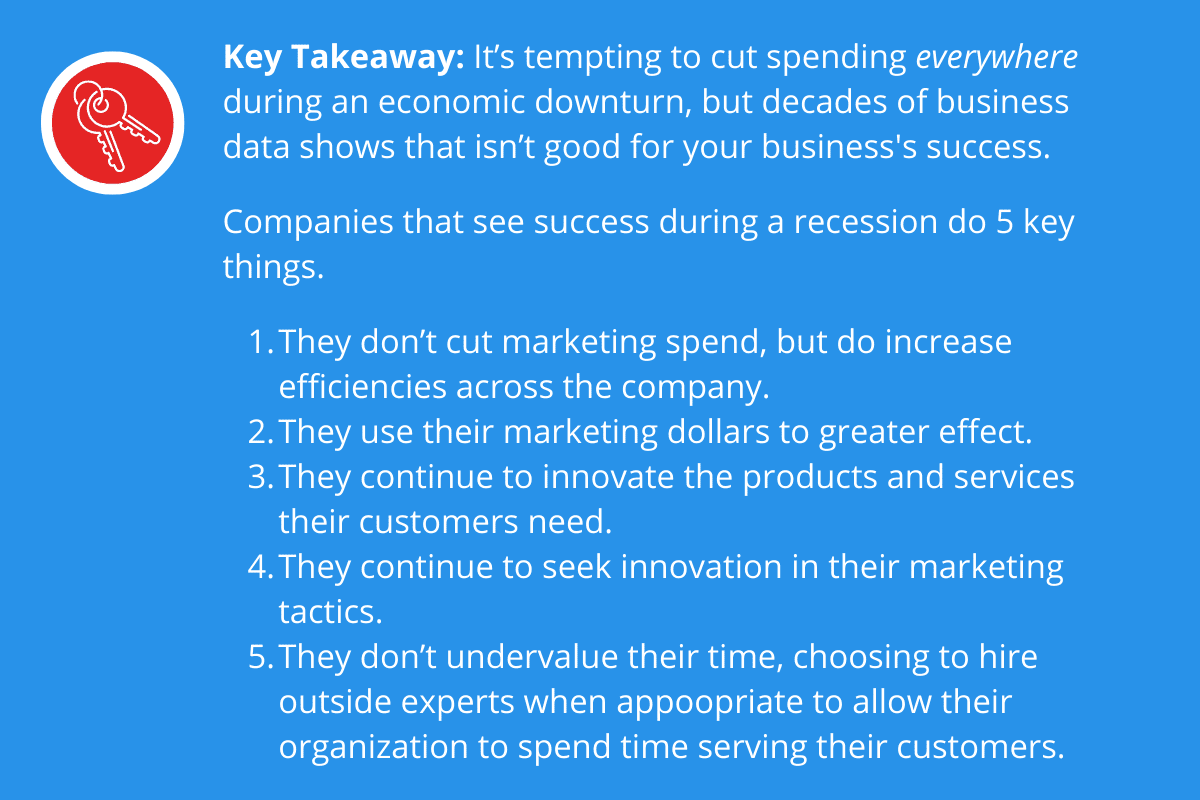 The last few years have had their fair share of incredible headlines. From a global pandemic to a boat stuck in the Suez canal to large supply shortages, there have been many, many unprecedented events with one big thing hitting after another. Now, everyone seems to be asking the same big question—are we or are we not in a recession?
The last few years have had their fair share of incredible headlines. From a global pandemic to a boat stuck in the Suez canal to large supply shortages, there have been many, many unprecedented events with one big thing hitting after another. Now, everyone seems to be asking the same big question—are we or are we not in a recession?
We’re NOT economists or global leaders, and the answer to that question is a lot more complicated than a “yes” or a “no,” but we ARE a small business marketing agency dedicated to the success of small businesses in our community. With that in mind, here are 5 key things businesses do to see success going into an economic downturn and coming out of one.
1. Don’t cut your marketing spending

With inflation rising and the price of goods going up, it makes sense to want to save money in your personal budget.In fact, the latest consumer research shows that 44% of consumers cut back on their grocery spending, and 45% of consumers cut back on dining out. While this makes sense from a personal finance perspective, it’s not the wisest decision for your business.
Statistically speaking, companies that maintain or increase marketing spend during tough times tend to come out ahead of the economic competition. Harvard Business Journal has dug into this phenomenon at length, chronicling stories such as the case of Reckitt Benckiser — the company responsible for products like Finish, Airwick, Clearasil, and Mucinex.
“In the recession following the 2008 financial crash, the company launched a marketing campaign aimed at persuading its consumers to continue purchasing its more expensive and better performing brands, despite the harsh economic climate. Increasing its advertising outlays by 25% in the face of reduced marketing by competitors, Reckitt Benckiser actually grew revenues by 8% and profits by 14%, when most of its rivals were reporting profit declines of 10% or more. They viewed advertising as an investment rather than an expense.” (Source Link)
The example might be a large organization, but the wisdom is transferable no matter the size of your company. By drastically reducing your marketing spend, you remove yourself from the conversation and open the door to let a competitor speak into the void. Staying out in front of your marketing efforts keeps you top of mind to your consumer. Maintaining your marketing spend is often the very thing that makes you relevant to buyers who are interested in your products and services…even in the downturn. If you must cut costs, look to operational efficiencies. The leaner your business is in doing what you do, the more room you have for profit after the recession ends.
2. Be smart with your marketing spending
Just because you keep your marketing efforts at the same investment level does NOT mean you should continue spending money on efforts with low return. Instead, turn to your marketing metrics and consider what marketing initiatives have shown the most return on your investment.
If you have good analytics, this should be fairly simple. If you don’t have good analytics, consider what you’ve done in the past that seems to have worked well, start there, and then monitor your success moving forward. Whether it’s asking customers how they found you or having an agency monitor key metrics, every little bit of data helps you make the right decisions for your business. Viewing marketing as an investment in the future of your company rather than an expense is critical overall.

A common maxim we’ve heard is “work smarter not harder.” While we certainly believe that hard work makes a difference, there’s a nugget of truth in constantly seeking improvement, efficiency, and opportunity in what you’re doing.
3. Don’t forget to innovate: service or products
It seems odd to talk about innovation and moving forward when the economy is contracting and shrinking back, but it’s important to do so. Maintaining a spirit of innovation and research & development at your company is crucial. Even in troubled times, people still have wants and needs. Consider: how does your product or service address those needs? Is there opportunity for you to expand into a new target market or offer a new product or service? By finding the opportunities available even in a downturn, you set your company up for success. New revenue streams can offset any dip in profits and can help you maintain sales numbers during a downturn, while also setting you up for a post-downturn sales bump when buyer spending power returns.
Beyond that, “research…shows that products launched during a recession have both higher long-term survival chances and higher sales revenues. That’s partly because there are fewer new products to compete with, but it also comes from the fact that companies maintaining R&D have focused the investment on their best prospects — which may explain why products introduced during recessions have been shown to be of higher quality” (source link). Innovation can lead to opportunity both in revenue and in your brand recognition and brand appreciation.
4. Don’t forget to innovate: new marketing tactics
Above, we said to focus on what works, and that’s certainly true, but you should also consider other marketing tactics that might lead to greater return. Selecting one or two new channels could help you connect with a new portion of your audience or the same people at a lower cost threshold. For example, in the franchising world, we often see franchises stick to the same old tactics due to their systemic marketing processes. But you should always consider trying new channels. By experimenting with new channels, like Google Ads or Social Media Ads, for instance, you open the opportunity to discover better marketing ROI.
5. Don’t get trapped by the idea of “free”
It’s easy to look at everything going on and decide to do some things yourself, but it’s foolish to consider your time and effort as “free.” Your time has a cost — and a very high one at that!
As a business owner, your time is money. Often, you are the one doing things no one else on your team can do — from driving sales to connecting with other businesses to creating new products. Every minute you spend chasing a free solution or providing “free” labor to create an email campaign or improve your website is something that takes you away from revenue-producing efforts. It might be “free” on paper, but knowing what things are worth your investment of time and what things aren’t is critical to success in a time of uncertainty.



